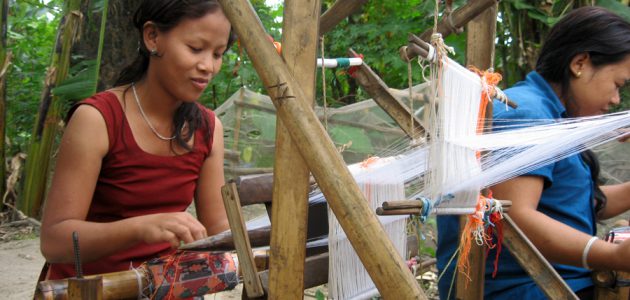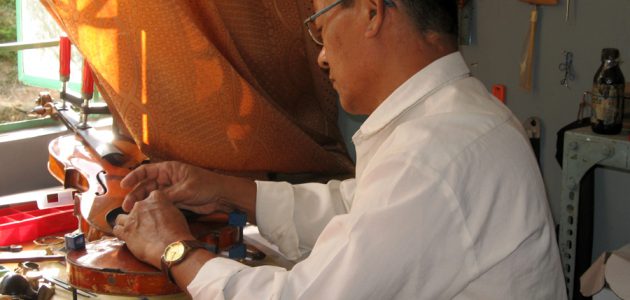Livelihood support: To live life to the fullest

Throughout November, Canadian Jesuits International (CJI) is raising awareness and funds for livelihood support through its Giving Tuesday campaign called Tell Ten. Today igNation posts the first in a series of blogs about what livelihood support means to CJI and to people in the Global South.
Lima, a woman I met in Matigara, India, proudly showed me the shawls and saris that she and a number of other women produce and sell to local people. They participate in a livelihood support program run by the Human Life Development and Research Centre of the Darjeeling Jesuit Province. The women are being trained in weaving and marketing and, thanks to the program, they are earning an income and feeding their families. In fact, they are so successful that they can hardly keep up with demand.

Weaving provides a livelihood for Bhutanese refugees in Nepal”. Credit: “J. Cafiso/CJI”
The phrase “livelihood support” for me has names and faces, like Lima’s. It is the face of Wilfreda who lives in a swamp in Ecuador. Her family has sewage running underneath their house because her husband’s fishing does not provide enough for them to live anywhere else. She said they needed a better livelihood in order to live in better conditions.
I remember Sarah, a widow in Zambia, who thanks to Kasisi Agricultural Training Centre is now able to grow enough vegetables to feed her family, take some to market and send her kids to school. There was also James, a Liberian refugee in Guinea: he learned tailoring and had enough work in the refugee camp for him and his family to live beyond survival. And I remember the women in a slum of Peru where I worked: they formed a group and started to buy and sell fish collectively so that they were able to make extra income for themselves and for the group to buy food for their common kitchen.

Farmers produce organically grown food at Kasisi Agricultural Training Centre in Zambia”. Credit: “J. Cafiso/CJI”
Livelihood support addresses the yearnings of people like Lima, Wilfreda, Sarah, James and the women in Peru. It enables them to live a life with dignity, where food, health and education are not gifts, but human rights. Their stories and their hopes tell us the meaning of livelihood support.
It refers to the means people have to earn their own living, to not be dependent on handouts, to be productive, to be able to feed their families, to send their children to school. It often entails only small investments of time, money, advocacy or training, which then provide a way for people to sustain themselves and to live lives with dignity. It means having a way not merely to survive, but to develop to one’s full potential as a human being and to live life to the fullest. Livelihood support can thus mean having seeds to plant in one’s field, having training for a trade that pays a living wage, having access to a market to sell one’s products at a just price.

Repairing violins at Gandhi Ashram in Darjeeling, India”. Credit: “J. Cafiso/CJI”
In a world where income inequality continues to increase and vast sections of the world’s population do not have the essentials for life, livelihood support is not only a way to offer economic assistance, it can make the difference between life and death, between despair and hope. It signifies having the support that can transform us as human beings from beggars to actors.
For this to be so, the means to earn a livelihood have to be sustainable, safe, dignified and respecting of our rights, allowing us to live the fullest possible life. I see livelihood support as a way to fulfill God’s promise “I have come that they may have life, and have it to the full” (John 10:10).




Peter Bisson, SJ
Posted at 16:44h, 01 NovemberThank you Jenny!
To live life to the fullest | Canadian Jesuits International
Posted at 16:50h, 13 November[…] article first appeared on the igNation website on 1 November 2017. It is reproduced here by permission. Jenny Cafiso is Director of Canadian […]